PRESS & NEWS
Quick Question September 2022 Results: Would you do genetic testing if offered for free by a nonprofit?
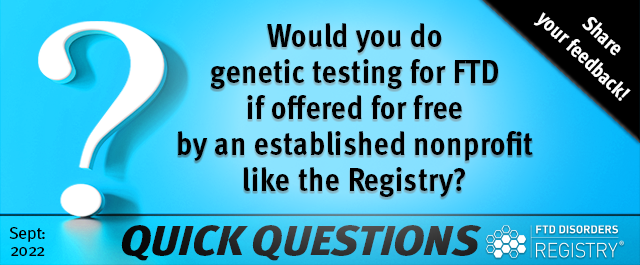
More than 950 people (70%) said “Yes” to the FTD Disorder Registry’s September 2022 Quick Question. There were 1,381 people who responded to the monthly poll.
More than 950 people (70%) said “Yes” to the FTD Disorder Registry’s September 2022 Quick Question: Would you do genetic testing for FTD if offered for free by an established nonprofit like the Registry?
There were 1,381 people who responded to the monthly poll. Of those, 191 people (14%) said they would not do genetic testing, and 224 (16%) indicated that it would depend on various reasons as to whether they would or would not choose to be tested.
People were offered the main options of “Yes,” “No,” and “It depends on.” After making this selection, they then picked the reason(s) for this choice. Multiple responses were allowed, including write-in answers for “It depends on.”
Of those who responded “Yes,” the number one reason was to “know my family’s risk (633). This was followed by a distant second and third of “so that I may qualify for a clinical trial to test a treatment” (342) and “more trust in a program offered by a nonprofit like the Registry” (324).
Of those who responded “No,” the top two reasons were:
- not interested in genetic counseling or testing (77)
- to learn about my family’s risk until there are proven treatments (60)
Top considerations for those who responded to “It depends on …” included:
- if I can receive my results (87)
- who will see my results (85)
- if it will help bring about effective treatments (80)
- if I can get free, confidential genetic counseling (75)
- what I learn during genetic counseling (70)
The 45 write-in answers to “It depends on …” covered similar topics including:
- all ready tested (10)
- insurance concerns (9)
- privacy concerns (8)
- location of testing and travel considerations (7)
- type of test required (3).
In addition, several people (8) felt it was up to others to decide whether to undergo genetic counseling and testing.
Of those who wrote in, some had already been tested but expressed interest in re-testing if new FTD genes were identified.
Responses were received from people in 26 countries around the world with the most coming from the United States (1,249) followed by Canada (67), the United Kingdom and Northern Ireland (20), and Australia (14).
Additionally, answers came from people in all 50 U.S. states as well as the District of Columbia (9) and Puerto Rico (1). The top five states with the highest number of respondents were California (119), New York (89), Texas (75), New Jersey (67), and Pennsylvania (65).
RESULTS
The following charts and lists are based on 1,381 submissions.
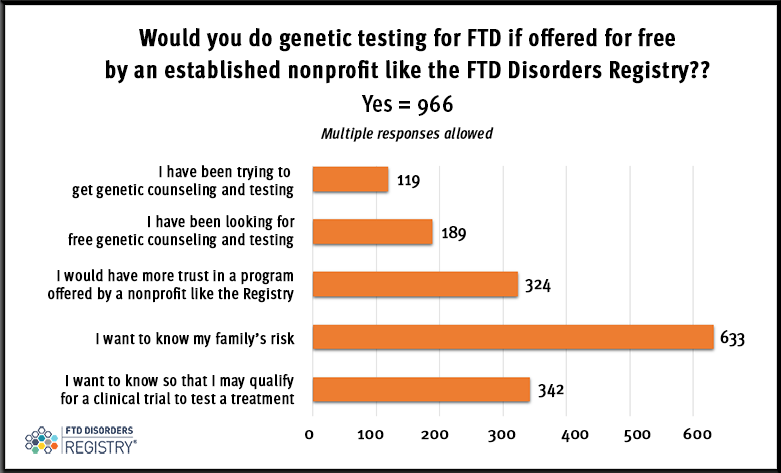
Yes, 966 responses (70%):
- 7% I have been trying to get genetic counseling and testing
- 12% I have been looking for free genetic counseling and testing
- 20% I would have more trust in a program offered by a nonprofit like the Registry
- 40% I want to know my family’s risk
- 21% I want to know so that I may qualify for a clinical trial to test a treatment
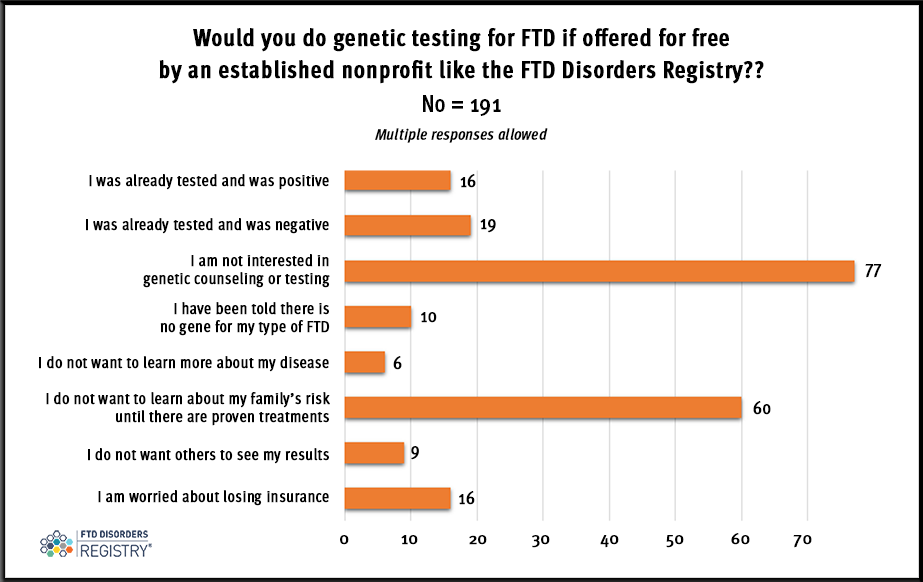
No, 191 responses (14%):
- 7.5% I was already tested and was positive
- 9% I was already tested and was negative
- 36% I am not interested in genetic counseling or testing
- 5% I have been told there is no gene for my type of FTD
- 3% I do not want to learn more about my disease
- 28% I do not want to learn about my family’s risk until there are proven treatments
- 4% I do not want others to see my results
- 7.5% I am worried about losing insurance
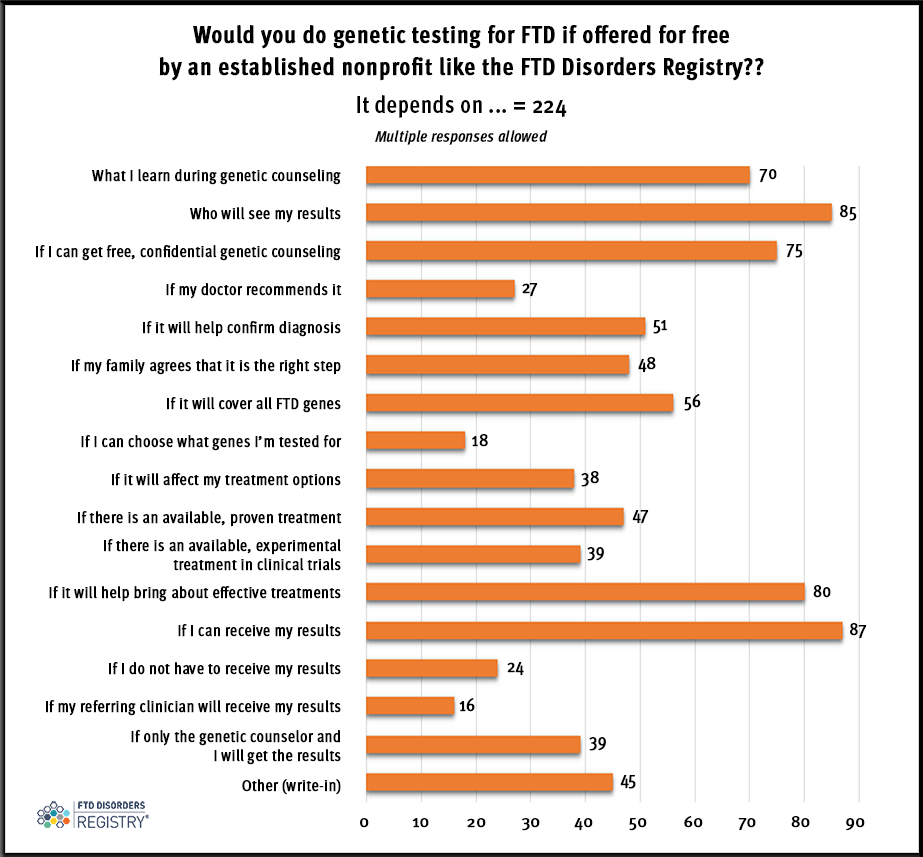
It depends on … 224 responses (16%):
- 8% What I learn during genetic counseling
- 10% Who will see my results
- 9% If I can get free, confidential genetic counseling
- 3% If my doctor recommends it
- 6% If it will help confirm diagnosis
- 6% If my family agrees that it is the right step
- 7% If it will cover all FTD genes
- 2% If I can choose what genes I’m tested for
- 4.5% If it will affect my treatment options
- 6% If there is an available, proven treatment
- 5% If there is an available, experimental treatment in clinical trials
- 9.5% If it will help bring about effective treatments
- 10% If I can receive my results
- 3% If I do not have to receive my results
- 2% If my referring clinician will receive my results
- 5% If only the genetic counselor and I will get the results
- 5% Other (write-in)
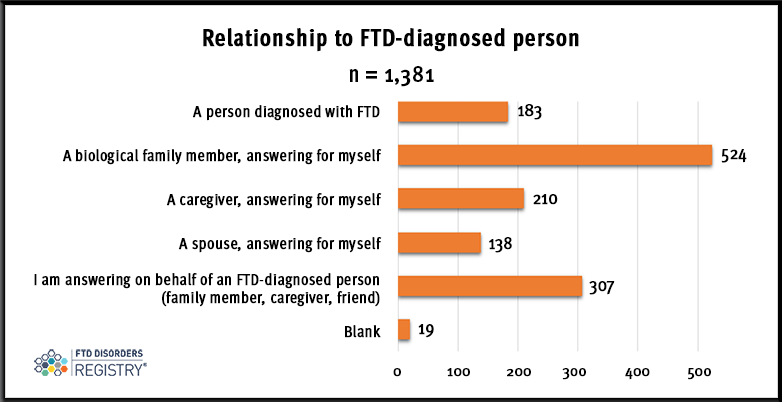
Identify yourself results:
- 13% A person diagnosed with FTD
- 38% Biological family member, answering for myself
- 15% Spouse, answering for myself
- 10% Caregiver, answering for myself
- 22.5% Answering on behalf of an FTD-diagnosed person (family member, caregiver, friend)
- 1.5% Blank
Together we can find a cure for ftd
The FTD Disorders Registry is a powerful tool in the movement to create therapies and find a cure. Together we can help change the course of the disease and put an end to FTD.
Your privacy is important! We promise to protect it. We will not share your contact information.



